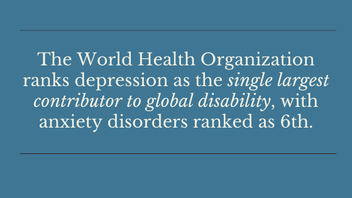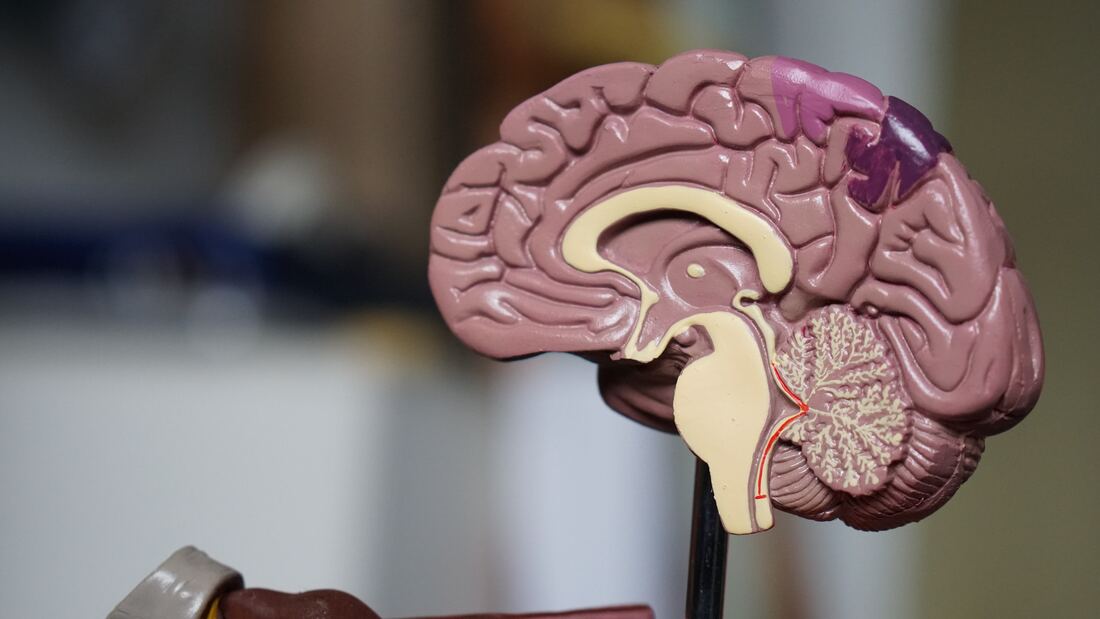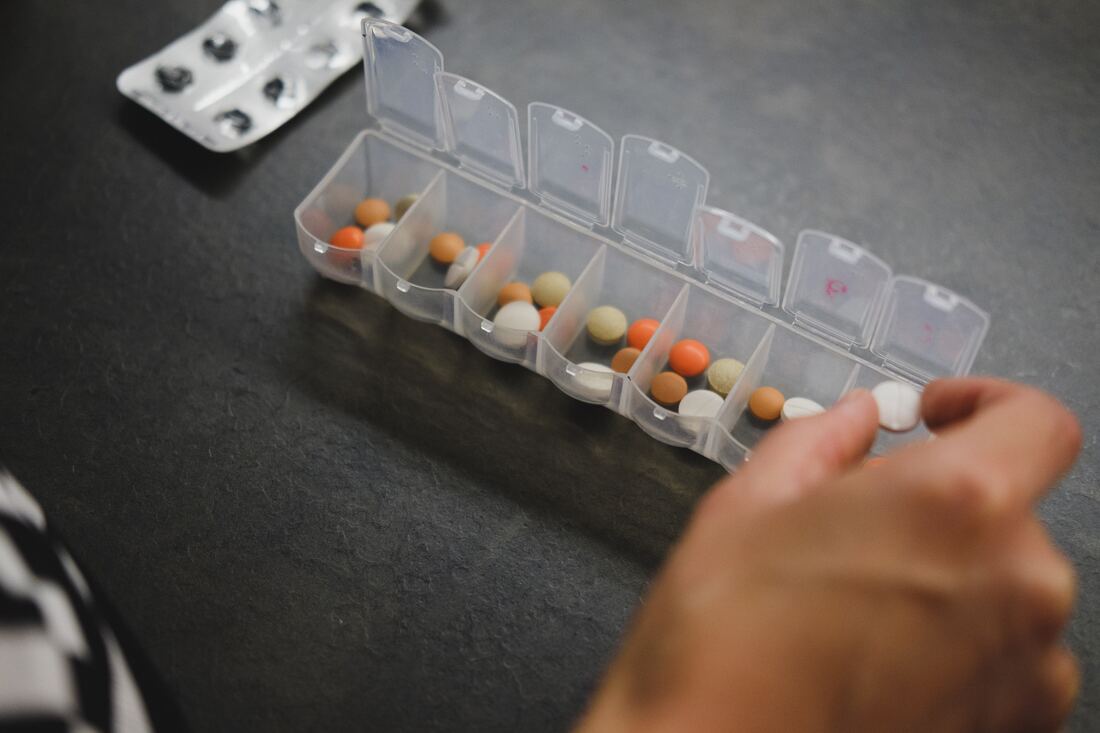 Worldwide, the NCBI estimates that one in five adults (17.6%) within the past year have struggled with a mood disorder (that is, any mental illness defined by the inability to regulate one's mood, such that it impacts one’s ability to function throughout the day), while 300 million (roughly 4.4%) individuals worldwide suffer from depression alone (1). The World Health Organization ranks depression as the single largest contributor to global disability, with anxiety disorders ranked as 6th. The sobering takeaway is that thousands of individuals struggle with mood disorders every single day, including anxiety, depression, PTSD, bipolar, and more. Chances are you have friends or family battling with some form of mental health disorder, or have struggled with one yourself. Even if you have had little to no exposure to mood disorders, the fact remains that you have still experienced anxiety, severe sadness, stress, and other difficult-to-manage emotions. In this post, we’ll explore CBD’s potential in aiding those with mood disorders. CBD and mood disorders Remember last week's post about the Endocannabinoid system? It’s laregly by virtue of this system that CBD and other endocannabinoids have such potential in treating some of the underlying causes of mood disorders. This is because CBD works through multiple pathways, affecting specific pathways in the brain associated with mood regulation. How it works *it’s important to know that most of the studies referenced below are animal studies, meaning that we still do not entirely know the effects of CBD on the human brain. That being said, the research is promising, and the potential for CBD in treating mental disorders is vast. The animal studies below strongly suggest multiple ways in which CBD may be effective in treating neuropsychiatric illnesses. Depression is an immensely complex condition. There is no single underlying cause, and we have much to learn in the way of treating it. According to the Institut Pasteur, 30% of patients are resistant to conventional treatment, including pharmaceutical SSRIs and MAOIs (2). In recent years, our understanding of neuroinflammation and its connection to depression has grown immensely. Neuroinflammation, inflammation of nervous tissue in the brain, is now considered to be one of the major underlying causes of depression- paving the way for new and potentially more effective methods of treatment. CBD has been shown to reduce neuroinflammation substantially (3), making it a potentially highly viable treatment for depressive disorder. Moreover, CBD has been shown to increase the health and function of the hippocampus (4), a part of the human brain responsible for mood regulation. Studies have shown that individuals suffering from mood disorders often have damage in the hippocampus region of the brain. One common cause of structural degeneration and impaired functioning in the hippocampus is chronic stress and anxiety, which may lead to an increase in susceptibility to neuropsychiatric disorders. While more longitudinal research is needed, studies suggest that treatments reversing stress-induced degeneration of the hippocampus may be viable for addressing mood disorders. CBD has also been shown to affect receptors in our brain responsible for regulating the uptake of serotonin and potentially increasing the amount of serotonin in our brains, combating depression and anxiety caused by depleted levels of serotonin. (5)  CBD versus Pharmaceutical Medications *CBD is not a replacement for prescribed medications. If you are currently taking a pharmaceutical medication, talk to your doctor before taking CBD or any health supplement which may interact with your medication. Quitting pharmaceutical medications without the support and advice of your doctor may have severe adverse effects. Pharmaceutical medications have come a long way in treating mental health. That being said, there is a lot left to be desired. It’s like opening the hood of your car and pouring steering fluid everywhere, in the hopes that some of the fluid falls where it needs to go. Some of it may end up in the right place and your car may continue to function regularly, but it’s not exactly efficient. Not to mention the fact that pouring steering fluid in places that aren’t meant to be covered in steering fluid may have some seriously adverse effects. Medications act in a similar way- they treat the whole brain, only sometimes affecting and addressing specific pathways. They are largely inefficient methods of treatments, often causing a number of negative side effects, including Insomnia, sexual dysfunction, mood swings, and agitation (not to mention long-term side effects- a subject that we know very little about). CBD has not been shown to produce any such effects. One animal study found that while antidepressants often took weeks to work, CBD had ‘fast and sustained’ antidepressant effects (6). This can be immensely helpful for those unable to wait weeks before feeling the affects of treatment. Multiple other studies have found that CBD significantly reduced levels of anxiety in individuals suffering from anxiety disorders such as SAD (7). The bottom line There is still much to learn about the potential effects of CBD on mood disorders. As mentioned above, most of the studies referenced throughout this blog are animal studies, meaning that the findings in regards to effects on the human brain are merely preliminary. That being said, the research strongly suggests that CBD may be viable for treating mood disorders. As always, talk to your doctor before taking CBD or any health supplement. Citations
|
AuthorCBD AllAY Archives
November 2020
Categories
All
|
Shipping and Warm Weather policy: As our product is heat sensitive - we do not ship over weekends and or holidays during peak summer months. We contact all customers with shipping notifications and please store your product in a cool dry place.
Terms Of Service | Privacy Policy | Medical Disclaimer
The Information contained on this site is not intended to diagnose or treat any condition and should not replace medical advice. Always consult with a physician or other health-care professional. Keep out of the reach of children.
This product should be used only as directed on the label. It should not be used if you are pregnant or nursing. Consult with a physician before use if you have a serious medical condition or use prescription medications. A Doctor’s advice should be sought before using this and any supplement dietary product. All trademarks and copyrights are property of their respective owners and are not affiliated with nor do they endorse this product.
This product should be used only as directed on the label. It should not be used if you are pregnant or nursing. Consult with a physician before use if you have a serious medical condition or use prescription medications. A Doctor’s advice should be sought before using this and any supplement dietary product. All trademarks and copyrights are property of their respective owners and are not affiliated with nor do they endorse this product.




 RSS Feed
RSS Feed
